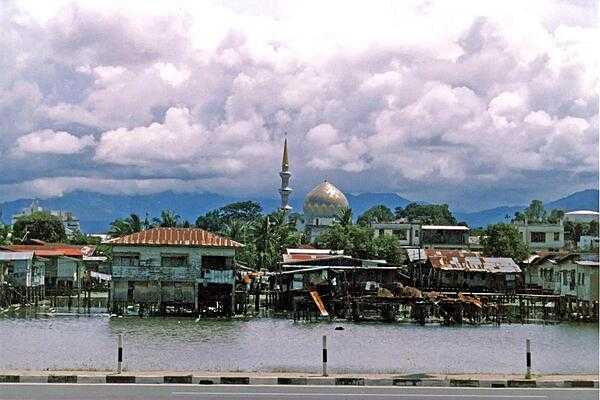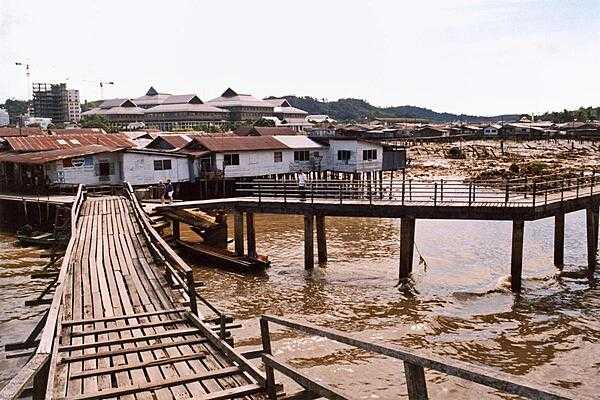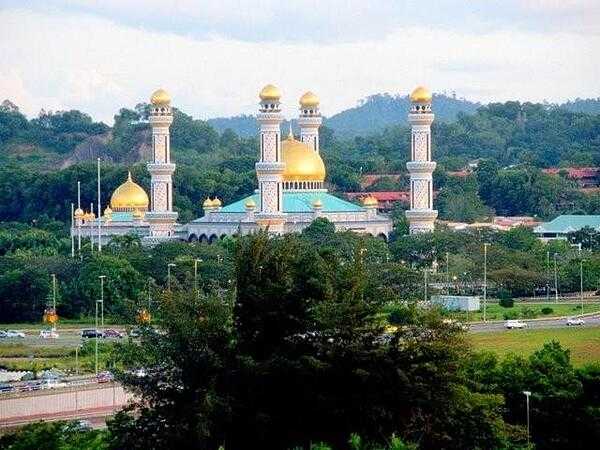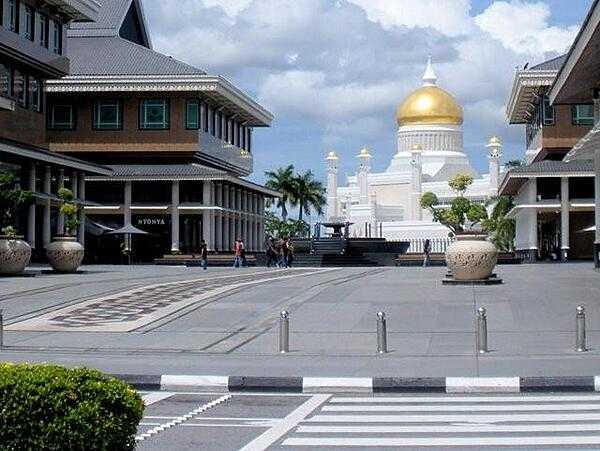Brunei - BN - BRN - BRU - East and Southeast Asia
Last updated: January 21, 2026
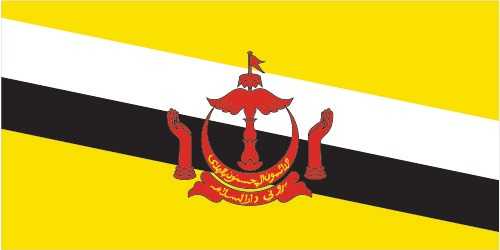
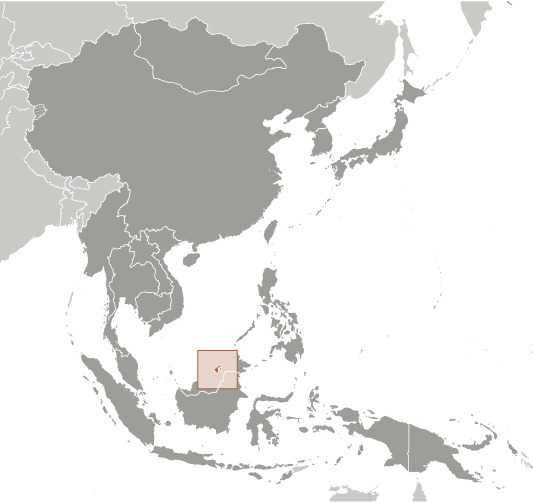
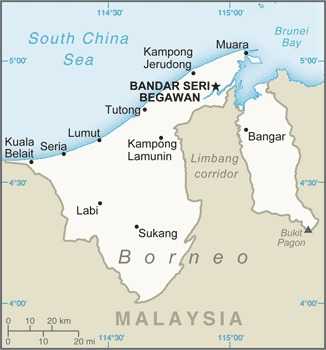
Brunei Images
Brunei Factbook Data
Diplomatic representation from the US
chief of mission: Ambassador Caryn R. McCLELLAND (since December 2021)
embassy: Simpang 336-52-16-9, Jalan Duta, Bandar Seri Begawan, BC4115
mailing address: 4020 Bandar Seri Begawan Place, Washington DC 20521-4020
telephone: (673) 238-7400
FAX: (673) 238-7533
email address and website:
ConsularBrunei@state.gov
https://bn.usembassy.gov/
embassy: Simpang 336-52-16-9, Jalan Duta, Bandar Seri Begawan, BC4115
mailing address: 4020 Bandar Seri Begawan Place, Washington DC 20521-4020
telephone: (673) 238-7400
FAX: (673) 238-7533
email address and website:
ConsularBrunei@state.gov
https://bn.usembassy.gov/
Age structure
0-14 years: 21.7% (male 54,924/female 51,710)
15-64 years: 70.8% (male 166,289/female 182,011)
65 years and over: 7.5% (2024 est.) (male 17,927/female 19,039)
15-64 years: 70.8% (male 166,289/female 182,011)
65 years and over: 7.5% (2024 est.) (male 17,927/female 19,039)
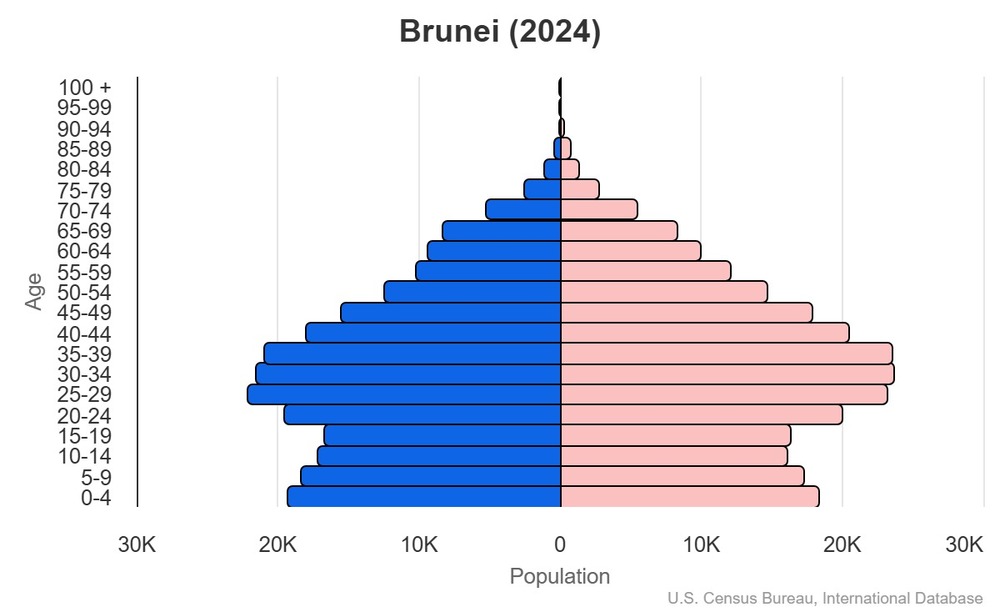
This is the population pyramid for Brunei. A population pyramid illustrates the age and sex structure of a country's population and may provide insights about political and social stability, as well as economic development. The population is distributed along the horizontal axis, with males shown on the left and females on the right. The male and female populations are broken down into 5-year age groups represented as horizontal bars along the vertical axis, with the youngest age groups at the bottom and the oldest at the top. The shape of the population pyramid gradually evolves over time based on fertility, mortality, and international migration trends.
For additional information, please see the entry for Population pyramid on the Definitions and Notes page.
For additional information, please see the entry for Population pyramid on the Definitions and Notes page.
Geographic coordinates
4 30 N, 114 40 E
Sex ratio
at birth: 1.05 male(s)/female
0-14 years: 1.06 male(s)/female
15-64 years: 0.91 male(s)/female
65 years and over: 0.94 male(s)/female
total population: 0.95 male(s)/female (2024 est.)
0-14 years: 1.06 male(s)/female
15-64 years: 0.91 male(s)/female
65 years and over: 0.94 male(s)/female
total population: 0.95 male(s)/female (2024 est.)
Natural hazards
typhoons, earthquakes, and severe flooding are rare
Area - comparative
slightly smaller than Delaware
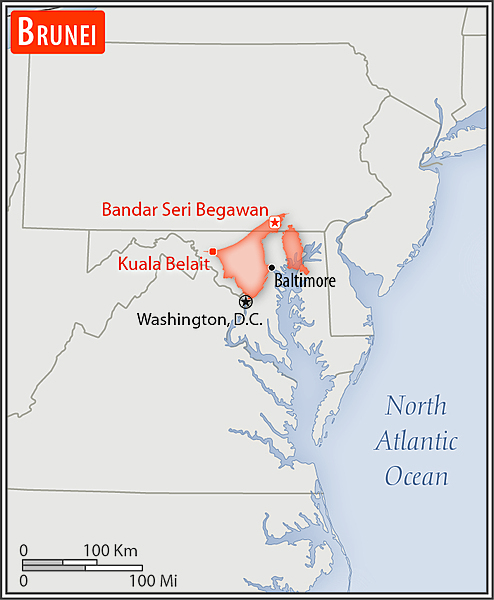
slightly smaller than Delaware
Military service age and obligation
18-25 years of age for voluntary military service (2025)
note: the Gurkha Reserve Unit (GRU) employs hundreds of Gurkhas from Nepal, the majority of whom are veterans of the British Army and the Singapore Police Force who have joined the GRU as a second career
note: the Gurkha Reserve Unit (GRU) employs hundreds of Gurkhas from Nepal, the majority of whom are veterans of the British Army and the Singapore Police Force who have joined the GRU as a second career
Background
The Sultanate of Brunei's influence peaked between the 15th and 17th centuries, when its control extended over coastal areas of northwest Borneo and the southern Philippines. Internal strife over royal succession, colonial expansion of European powers, and piracy subsequently brought on a period of decline. In 1888, Brunei became a British protectorate; independence was achieved in 1984. The same family has ruled Brunei for over six centuries, and in 2017, the country celebrated the 50th anniversary of Sultan Hassanal BOLKIAH’s accession to the throne. Brunei has one of the highest per-capita GDPs in the world, thanks to extensive petroleum and natural gas fields.
Environmental issues
air pollution, including seasonal haze from forest fires in Indonesia
International environmental agreements
party to: Biodiversity, Climate Change, Climate Change-Kyoto Protocol, Climate Change-Paris Agreement, Comprehensive Nuclear Test Ban, Desertification, Endangered Species, Hazardous Wastes, Law of the Sea, Ozone Layer Protection, Ship Pollution
signed, but not ratified: none of the selected agreements
signed, but not ratified: none of the selected agreements
Military expenditures
3% of GDP (2023 est.)
2.6% of GDP (2022 est.)
3.1% of GDP (2021 est.)
3.7% of GDP (2020 est.)
3.1% of GDP (2019 est.)
2.6% of GDP (2022 est.)
3.1% of GDP (2021 est.)
3.7% of GDP (2020 est.)
3.1% of GDP (2019 est.)
Exports - commodities
refined petroleum, natural gas, crude petroleum, hydrocarbons, fertilizers (2023)
note: top five export commodities based on value in dollars
note: top five export commodities based on value in dollars
Exports - partners
Australia 21%, Japan 17%, China 17%, Singapore 16%, Malaysia 6% (2023)
note: top five export partners based on percentage share of exports
note: top five export partners based on percentage share of exports
Administrative divisions
4 districts (daerah-daerah, singular - daerah); Belait, Brunei dan Muara, Temburong, Tutong
Agricultural products
chicken, eggs, fruits, vegetables, rice, bananas, beans, cucumbers/gherkins, pineapples, beef (2023)
note: top ten agricultural products based on tonnage
note: top ten agricultural products based on tonnage
Military and security forces
Royal Brunei Armed Forces (RBAF) or Angkatan Bersenjata Diraja Brunei (ABDB): Royal Brunei Land Force (RBLF), Royal Brunei Navy (RBN), Royal Brunei Air Force (RBAirF) (2025)
note 1: the Gurkha Security Unit under the Ministry of Defense is a special guard force for the Sultan, the royal family, and the country’s oil installations
note 2: the Royal Brunei Police Force (RBPF) is under the Prime Minister's Office
note 1: the Gurkha Security Unit under the Ministry of Defense is a special guard force for the Sultan, the royal family, and the country’s oil installations
note 2: the Royal Brunei Police Force (RBPF) is under the Prime Minister's Office
Budget
revenues: $1.058 billion (2020 est.)
expenditures: $3.189 billion (2020 est.)
expenditures: $3.189 billion (2020 est.)
Capital
name: Bandar Seri Begawan
geographic coordinates: 4 53 N, 114 56 E
time difference: UTC+8 (13 hours ahead of Washington, DC, during Standard Time)
etymology: named in 1970 after Sultan Omar Ali SAIFUDDIEN III (1914-1986), who adopted the title of "Seri Begawan" (approximately meaning "honored lord") when he abdicated in 1967; "bandar" means "city" or "port" in Malay; the capital had previously been called Bandar Brunei (Brunei City)
geographic coordinates: 4 53 N, 114 56 E
time difference: UTC+8 (13 hours ahead of Washington, DC, during Standard Time)
etymology: named in 1970 after Sultan Omar Ali SAIFUDDIEN III (1914-1986), who adopted the title of "Seri Begawan" (approximately meaning "honored lord") when he abdicated in 1967; "bandar" means "city" or "port" in Malay; the capital had previously been called Bandar Brunei (Brunei City)
Imports - commodities
crude petroleum, gold, refined petroleum, coal, cars (2023)
note: top five import commodities based on value in dollars
note: top five import commodities based on value in dollars
Climate
tropical; hot, humid, rainy
Coastline
161 km
Constitution
history: drafted 1954 to 1959, signed 29 September 1959
amendment process: proposed by the monarch; passage requires submission to the Privy Council for Legislative Council review and finalization takes place by proclamation; the monarch can accept or reject changes to the original proposal provided by the Legislative Council
note: some constitutional provisions suspended since 1962 under a state of emergency, others suspended since independence in 1984
amendment process: proposed by the monarch; passage requires submission to the Privy Council for Legislative Council review and finalization takes place by proclamation; the monarch can accept or reject changes to the original proposal provided by the Legislative Council
note: some constitutional provisions suspended since 1962 under a state of emergency, others suspended since independence in 1984
Exchange rates
Bruneian dollars (BND) per US dollar -
Exchange rates:
1.336 (2024 est.)
1.343 (2023 est.)
1.379 (2022 est.)
1.344 (2021 est.)
1.38 (2020 est.)
Exchange rates:
1.336 (2024 est.)
1.343 (2023 est.)
1.379 (2022 est.)
1.344 (2021 est.)
1.38 (2020 est.)
Executive branch
chief of state: Sultan and Prime Minister Sir HASSANAL Bolkiah (since 5 October 1967)
head of government: Sultan and Prime Minister Sir HASSANAL Bolkiah (since 5 October 1967)
cabinet: Council of Ministers appointed and presided over by the monarch
election/appointment process: none; the monarchy is hereditary
note 1: the monarch is both chief of state and head of government, as well as Minister of Finance, Defense, and Foreign Affairs and Trade
note 2: 4 additional advisory councils appointed by the monarch are the Religious Council, Privy Council for Constitutional Issues, Council of Succession, and Legislative Council
head of government: Sultan and Prime Minister Sir HASSANAL Bolkiah (since 5 October 1967)
cabinet: Council of Ministers appointed and presided over by the monarch
election/appointment process: none; the monarchy is hereditary
note 1: the monarch is both chief of state and head of government, as well as Minister of Finance, Defense, and Foreign Affairs and Trade
note 2: 4 additional advisory councils appointed by the monarch are the Religious Council, Privy Council for Constitutional Issues, Council of Succession, and Legislative Council
Flag
description: yellow with a diagonal white band and second below it in black, both starting from the upper left; the national emblem in red is at the center; the state motto, "Always render service with God's guidance," appears in yellow Arabic script on the emblem's crescent; a ribbon below the crescent reads "Brunei, the Abode of Peace"
meaning: yellow symbolizes the sultanate, and the white and black bands stand for the chief ministers; the emblem includes a royal umbrella (the monarchy), two wings with four feathers (justice, tranquility, prosperity, and peace), two upraised hands (the government's pledge to preserve and promote the people's welfare), and the crescent moon of Islam (the state religion)
meaning: yellow symbolizes the sultanate, and the white and black bands stand for the chief ministers; the emblem includes a royal umbrella (the monarchy), two wings with four feathers (justice, tranquility, prosperity, and peace), two upraised hands (the government's pledge to preserve and promote the people's welfare), and the crescent moon of Islam (the state religion)
Independence
1 January 1984 (from the UK)
Industries
petroleum, petroleum refining, liquefied natural gas, construction, agriculture, aquaculture, transportation
Judicial branch
highest court(s): Supreme Court (consists of the Court of Appeal and the High Court, each with a chief justice and 2 judges); Sharia Court (consists the Court of Appeals and the High Court)
judge selection and term of office: Supreme Court judges appointed by the monarch to serve until age 65, and older if approved by the monarch; Sharia Court judges appointed by the monarch for life
subordinate courts: Intermediate Court; Magistrates' Courts; Juvenile Court; small claims courts; lower sharia courts
note: Brunei has a dual judicial system of secular and sharia (religious) courts; the Judicial Committee of Privy Council (in London) serves as the final appellate court for civil cases only
judge selection and term of office: Supreme Court judges appointed by the monarch to serve until age 65, and older if approved by the monarch; Sharia Court judges appointed by the monarch for life
subordinate courts: Intermediate Court; Magistrates' Courts; Juvenile Court; small claims courts; lower sharia courts
note: Brunei has a dual judicial system of secular and sharia (religious) courts; the Judicial Committee of Privy Council (in London) serves as the final appellate court for civil cases only
Land boundaries
total: 266 km
border countries (1): Malaysia 266 km
border countries (1): Malaysia 266 km
Land use
agricultural land: 2.5% (2023 est.)
arable land: 0.8% (2023 est.)
permanent crops: 1.1% (2023 est.)
permanent pasture: 0.6% (2023 est.)
forest: 72.1% (2023 est.)
other: 25.4% (2023 est.)
arable land: 0.8% (2023 est.)
permanent crops: 1.1% (2023 est.)
permanent pasture: 0.6% (2023 est.)
forest: 72.1% (2023 est.)
other: 25.4% (2023 est.)
Legal system
mixed legal system based on English common law and Islamic law
note: in 2019, sharia penal codes came into force and apply to Muslims and partly to non-Muslims in parallel with common law codes
note: in 2019, sharia penal codes came into force and apply to Muslims and partly to non-Muslims in parallel with common law codes
Legislative branch
legislature name: Legislative Council (Majlis Mesyuarat Negara)
legislative structure: unicameral
number of seats: 45 (all appointed)
electoral system: plurality/majority
scope of elections: full renewal
term in office: 5 years
most recent election date: 1/20/2023
percentage of women in chamber: 11.4%
expected date of next election: January 2028
legislative structure: unicameral
number of seats: 45 (all appointed)
electoral system: plurality/majority
scope of elections: full renewal
term in office: 5 years
most recent election date: 1/20/2023
percentage of women in chamber: 11.4%
expected date of next election: January 2028
Maritime claims
territorial sea: 12 nm
exclusive economic zone: 200 nm or to median line
exclusive economic zone: 200 nm or to median line
International organization participation
ADB, APEC, ARF, ASEAN, C, CP, EAS, FAO, G-77, IAEA, IBRD, ICAO, ICC (NGOs), ICRM, IDA, IFRCS, ILO, IMF, IMO, IMSO, Interpol, IOC, ISO (correspondent), ITSO, ITU, NAM, OIC, OPCW, UN, UNCTAD, UNESCO, UNIFIL, UNWTO, UPU, WCO, WHO, WIPO, WMO, WTO
National holiday
National Day, 23 February (1984)
note: 1 January 1984 was the date of independence from the UK, 23 February 1984 was the date of independence from British protection; the Sultan's birthday, 15 June
note: 1 January 1984 was the date of independence from the UK, 23 February 1984 was the date of independence from British protection; the Sultan's birthday, 15 June
Nationality
noun: Bruneian(s)
adjective: Bruneian
adjective: Bruneian
Natural resources
petroleum, natural gas, timber
Geography - note
close to vital sea lanes through South China Sea linking Indian and Pacific Oceans; two parts physically separated by Malaysia; the eastern part, the Temburong district, is an exclave and is almost an enclave within Malaysia
Economic overview
almost exclusively an oil and gas economy; high income country; expansive and robust welfare system; the majority of the population works for the government; promulgating a nationalized halal brand; considering establishment of a bond market and stock exchange
Political parties
National Development Party or NDP
note: the NDP is Brunei’s only registered party, but does not have representation in the Legislative Council, which is appointed
note: the NDP is Brunei’s only registered party, but does not have representation in the Legislative Council, which is appointed
Suffrage
18 years of age for village elections; universal
Terrain
flat coastal plain rises to mountains in east; hilly lowland in west
Government type
absolute monarchy or sultanate
Country name
conventional long form: Brunei Darussalam
conventional short form: Brunei
local long form: Negara Brunei Darussalam
local short form: Brunei
etymology: derivation of the name is unclear; the name may come from the Sanskrit word bhumi, meaning "land" or "region"
conventional short form: Brunei
local long form: Negara Brunei Darussalam
local short form: Brunei
etymology: derivation of the name is unclear; the name may come from the Sanskrit word bhumi, meaning "land" or "region"
Location
Southeastern Asia, along the northern coast of the island of Borneo, bordering the South China Sea and Malaysia
Map references
Southeast Asia
Irrigated land
10 sq km (2012)
Diplomatic representation in the US
chief of mission: Ambassador (vacant); Chargé d'Affaires IZZATI Baharuddin (since 6 May 2025)
chancery: 3520 International Court NW, Washington, DC 20008
telephone: [1] (202) 237-1838
FAX: [1] (202) 885-0560
email address and website:
info@bruneiembassy.org
http://www.bruneiembassy.org/index.html
consulate(s): New York
chancery: 3520 International Court NW, Washington, DC 20008
telephone: [1] (202) 237-1838
FAX: [1] (202) 885-0560
email address and website:
info@bruneiembassy.org
http://www.bruneiembassy.org/index.html
consulate(s): New York
Internet users
percent of population: 99% (2023 est.)
Internet country code
.bn
Refugees and internally displaced persons
stateless persons: 20,863 (2024 est.)
GDP (official exchange rate)
$15.463 billion (2024 est.)
note: data in current dollars at official exchange rate
note: data in current dollars at official exchange rate
Total renewable water resources
8.5 billion cubic meters (2022 est.)
School life expectancy (primary to tertiary education)
total: 14 years (2023 est.)
male: 13 years (2023 est.)
female: 14 years (2023 est.)
male: 13 years (2023 est.)
female: 14 years (2023 est.)
Urbanization
urban population: 79.1% of total population (2023)
rate of urbanization: 1.44% annual rate of change (2020-25 est.)
rate of urbanization: 1.44% annual rate of change (2020-25 est.)
Broadcast media
state-controlled Radio Television Brunei (RTB) operates 5 channels; 3 Malaysian TV stations are available; foreign TV broadcasts are available via satellite systems; RTB operates 5 radio networks and broadcasts on multiple frequencies; British Forces Broadcast Service (BFBS) provides radio broadcasts on 2 FM stations; some radio broadcast stations from Malaysia are available via repeaters
National anthem(s)
title: "Allah Peliharakan Sultan" (God Bless His Majesty)
lyrics/music: Pengiran Haji Mohamed YUSUF bin Pengiran Abdul Rahim/Awang Haji BESAR bin Sagap
history: adopted 1951
lyrics/music: Pengiran Haji Mohamed YUSUF bin Pengiran Abdul Rahim/Awang Haji BESAR bin Sagap
history: adopted 1951
This is an audio of the National Anthem for Brunei. The national anthem is generally a patriotic musical composition - usually in the form of a song or hymn of praise - that evokes and eulogizes the history, traditions, or struggles of a nation or its people. National anthems can be officially recognized as a national song by a country's constitution or by an enacted law, or simply by tradition. Although most anthems contain lyrics, some do not.
Major urban areas - population
266,682 BANDAR SERI BEGAWAN (capital) (2021)
note: the boundaries of the capital city were expanded in 2007, greatly increasing the city area; the population of the capital increased tenfold
note: the boundaries of the capital city were expanded in 2007, greatly increasing the city area; the population of the capital increased tenfold
International law organization participation
has not submitted an ICJ jurisdiction declaration; non-party state to the ICC
Physician density
1.89 physicians/1,000 population (2021)
Hospital bed density
3.9 beds/1,000 population (2021 est.)
National symbol(s)
royal parasol
GDP - composition, by end use
household consumption: 28.5% (2024 est.)
government consumption: 23% (2024 est.)
investment in fixed capital: 28.2% (2024 est.)
investment in inventories: 0.2% (2024 est.)
exports of goods and services: 74.3% (2024 est.)
imports of goods and services: -58.9% (2024 est.)
note: figures may not total 100% due to rounding or gaps in data collection
government consumption: 23% (2024 est.)
investment in fixed capital: 28.2% (2024 est.)
investment in inventories: 0.2% (2024 est.)
exports of goods and services: 74.3% (2024 est.)
imports of goods and services: -58.9% (2024 est.)
note: figures may not total 100% due to rounding or gaps in data collection
Citizenship
citizenship by birth: no
citizenship by descent only: the father must be a citizen of Brunei
dual citizenship recognized: no
residency requirement for naturalization: 12 years
citizenship by descent only: the father must be a citizen of Brunei
dual citizenship recognized: no
residency requirement for naturalization: 12 years
Electricity access
electrification - total population: 100% (2022 est.)
Civil aircraft registration country code prefix
V8
Ethnic groups
Malay 67.4%, Chinese 9.6%, other 23% (2021 est.)
Religions
Muslim (official) 82.1%, Christian 6.7%, Buddhist 6.3%, other 4.9% (2021 est.)
Languages
Malay (Bahasa Melayu) (official), English, Chinese dialects
major-language sample(s):
Buku Fakta Dunia, sumber yang diperlukan untuk maklumat asas. (Malay)
The World Factbook, the indispensable source for basic information.
major-language sample(s):
Buku Fakta Dunia, sumber yang diperlukan untuk maklumat asas. (Malay)
The World Factbook, the indispensable source for basic information.
Malay audio sample
Imports - partners
Malaysia 23%, UAE 10%, China 10%, UK 10%, Australia 6% (2023)
note: top five import partners based on percentage share of imports
note: top five import partners based on percentage share of imports
Elevation
highest point: Bukit Pagon 1,850 m
lowest point: South China Sea 0 m
mean elevation: 478 m
lowest point: South China Sea 0 m
mean elevation: 478 m
Health expenditure
2.2% of GDP (2021)
6.4% of national budget (2022 est.)
6.4% of national budget (2022 est.)
Military and security service personnel strengths
approximately 7,000 active Armed Forces (2025)
Military equipment inventories and acquisitions
the military's s inventory includes equipment and weapons systems from a variety of suppliers from Asia, Europe, and the US (2025)
Drinking water source
improved:
total: 99.9% of population (2022 est.)
unimproved:
urban: 0.4% of population
rural: 0% of population
total: 0.1% of population (2022 est.)
total: 99.9% of population (2022 est.)
unimproved:
urban: 0.4% of population
rural: 0% of population
total: 0.1% of population (2022 est.)
Sanitation facility access
improved:
total: 99.5% of population (2022 est.)
unimproved:
total: 0.5% of population (2022 est.)
total: 99.5% of population (2022 est.)
unimproved:
total: 0.5% of population (2022 est.)
Population distribution
the vast majority of the population is found along the coast in the western part of Brunei, which is separated from the eastern portion by Malaysia; the largest population concentration is in the far north on the western side of the Brunei Bay, in and around the capital of Bandar Seri Begawan
Total water withdrawal
municipal: 151.5 million cubic meters (2022 est.)
agricultural: 5.3 million cubic meters (2022 est.)
agricultural: 5.3 million cubic meters (2022 est.)
Waste and recycling
municipal solid waste generated annually: 216,300 tons (2024 est.)
percent of municipal solid waste recycled: 20% (2022 est.)
percent of municipal solid waste recycled: 20% (2022 est.)
Trafficking in persons
tier rating: Tier 2 Watch List — Brunei does not fully meet the minimum standards for the elimination of trafficking but is making significant efforts to do so, therefore Brunei was upgraded to Tier 2 Watch List; for more details, go to: https://www.state.gov/reports/2025-trafficking-in-persons-report/brunei/
Coal
consumption: 841,000 metric tons (2023 est.)
imports: 841,000 metric tons (2023 est.)
imports: 841,000 metric tons (2023 est.)
Electricity generation sources
fossil fuels: 99.9% of total installed capacity (2023 est.)
solar: 0.1% of total installed capacity (2023 est.)
solar: 0.1% of total installed capacity (2023 est.)
Natural gas
production: 10.093 billion cubic meters (2023 est.)
consumption: 3.911 billion cubic meters (2023 est.)
exports: 5.733 billion cubic meters (2023 est.)
proven reserves: 260.515 billion cubic meters (2021 est.)
consumption: 3.911 billion cubic meters (2023 est.)
exports: 5.733 billion cubic meters (2023 est.)
proven reserves: 260.515 billion cubic meters (2021 est.)
Petroleum
total petroleum production: 95,000 bbl/day (2023 est.)
refined petroleum consumption: 15,000 bbl/day (2023 est.)
crude oil estimated reserves: 1.1 billion barrels (2021 est.)
refined petroleum consumption: 15,000 bbl/day (2023 est.)
crude oil estimated reserves: 1.1 billion barrels (2021 est.)
Gross reproduction rate
0.85 (2025 est.)
Remittances
0% of GDP (2023 est.)
0% of GDP (2022 est.)
0% of GDP (2021 est.)
note: personal transfers and compensation between resident and non-resident individuals/households/entities
0% of GDP (2022 est.)
0% of GDP (2021 est.)
note: personal transfers and compensation between resident and non-resident individuals/households/entities
Ports
total ports: 5 (2024)
large: 0
medium: 0
small: 2
very small: 3
ports with oil terminals: 5
key ports: Bandar Seri Begawan, Kuala Belait, Lumut, Muara Harbor, Seria Oil Loading Terminal
large: 0
medium: 0
small: 2
very small: 3
ports with oil terminals: 5
key ports: Bandar Seri Begawan, Kuala Belait, Lumut, Muara Harbor, Seria Oil Loading Terminal
National color(s)
yellow, white, black
Particulate matter emissions
7.4 micrograms per cubic meter (2019 est.)
Methane emissions
energy: 50.5 kt (2022-2024 est.)
agriculture: 0.9 kt (2019-2021 est.)
waste: 9.2 kt (2019-2021 est.)
other: 0.3 kt (2019-2021 est.)
agriculture: 0.9 kt (2019-2021 est.)
waste: 9.2 kt (2019-2021 est.)
other: 0.3 kt (2019-2021 est.)
Labor force
233,500 (2024 est.)
note: number of people ages 15 or older who are employed or seeking work
note: number of people ages 15 or older who are employed or seeking work
Youth unemployment rate (ages 15-24)
total: 18.5% (2024 est.)
male: 16.5% (2024 est.)
female: 21.6% (2024 est.)
note: % of labor force ages 15-24 seeking employment
male: 16.5% (2024 est.)
female: 21.6% (2024 est.)
note: % of labor force ages 15-24 seeking employment
Net migration rate
2.09 migrant(s)/1,000 population (2025 est.)
Median age
total: 32.6 years (2025 est.)
male: 31.4 years
female: 33.1 years
male: 31.4 years
female: 33.1 years
Maternal mortality ratio
36 deaths/100,000 live births (2023 est.)
Reserves of foreign exchange and gold
$4.414 billion (2024 est.)
$4.483 billion (2023 est.)
$5.035 billion (2022 est.)
note: holdings of gold (year-end prices)/foreign exchange/special drawing rights in current dollars
$4.483 billion (2023 est.)
$5.035 billion (2022 est.)
note: holdings of gold (year-end prices)/foreign exchange/special drawing rights in current dollars
Public debt
2.8% of GDP (2017 est.)
note: central government debt as a % of GDP
note: central government debt as a % of GDP
Total fertility rate
1.73 children born/woman (2025 est.)
Unemployment rate
5.2% (2024 est.)
5.2% (2023 est.)
5.2% (2022 est.)
note: % of labor force seeking employment
5.2% (2023 est.)
5.2% (2022 est.)
note: % of labor force seeking employment
Carbon dioxide emissions
10.823 million metric tonnes of CO2 (2023 est.)
from coal and metallurgical coke: 998,000 metric tonnes of CO2 (2023 est.)
from petroleum and other liquids: 2.175 million metric tonnes of CO2 (2023 est.)
from consumed natural gas: 7.65 million metric tonnes of CO2 (2023 est.)
from coal and metallurgical coke: 998,000 metric tonnes of CO2 (2023 est.)
from petroleum and other liquids: 2.175 million metric tonnes of CO2 (2023 est.)
from consumed natural gas: 7.65 million metric tonnes of CO2 (2023 est.)
Area
total : 5,765 sq km
land: 5,265 sq km
water: 500 sq km
land: 5,265 sq km
water: 500 sq km
Real GDP (purchasing power parity)
$36.64 billion (2024 est.)
$35.163 billion (2023 est.)
$34.771 billion (2022 est.)
note: data in 2021 dollars
$35.163 billion (2023 est.)
$34.771 billion (2022 est.)
note: data in 2021 dollars
Airports
2 (2025)
Infant mortality rate
total: 9.8 deaths/1,000 live births (2025 est.)
male: 12.2 deaths/1,000 live births
female: 7.7 deaths/1,000 live births
male: 12.2 deaths/1,000 live births
female: 7.7 deaths/1,000 live births
Inflation rate (consumer prices)
-0.4% (2024 est.)
0.4% (2023 est.)
3.7% (2022 est.)
note: annual % change based on consumer prices
0.4% (2023 est.)
3.7% (2022 est.)
note: annual % change based on consumer prices
Current account balance
$2.23 billion (2024 est.)
$1.944 billion (2023 est.)
$3.256 billion (2022 est.)
note: balance of payments - net trade and primary/secondary income in current dollars
$1.944 billion (2023 est.)
$3.256 billion (2022 est.)
note: balance of payments - net trade and primary/secondary income in current dollars
Real GDP per capita
$79,200 (2024 est.)
$76,600 (2023 est.)
$76,400 (2022 est.)
note: data in 2021 dollars
$76,600 (2023 est.)
$76,400 (2022 est.)
note: data in 2021 dollars
Broadband - fixed subscriptions
total: 93,000 (2023 est.)
subscriptions per 100 inhabitants: 20 (2023 est.)
subscriptions per 100 inhabitants: 20 (2023 est.)
Tobacco use
total: 17% (2025 est.)
male: 31.2% (2025 est.)
female: 1.9% (2025 est.)
male: 31.2% (2025 est.)
female: 1.9% (2025 est.)
Obesity - adult prevalence rate
14.1% (2016)
Energy consumption per capita
403.365 million Btu/person (2023 est.)
Death rate
3.96 deaths/1,000 population (2025 est.)
Birth rate
15.58 births/1,000 population (2025 est.)
Electricity
installed generating capacity: 904,000 kW (2023 est.)
consumption: 5.081 billion kWh (2023 est.)
transmission/distribution losses: 502.188 million kWh (2023 est.)
consumption: 5.081 billion kWh (2023 est.)
transmission/distribution losses: 502.188 million kWh (2023 est.)
Merchant marine
total: 97 (2023)
by type: general cargo 18, oil tanker 2, other 77
by type: general cargo 18, oil tanker 2, other 77
Imports
$9.11 billion (2024 est.)
$9.077 billion (2023 est.)
$10.099 billion (2022 est.)
note: balance of payments - imports of goods and services in current dollars
$9.077 billion (2023 est.)
$10.099 billion (2022 est.)
note: balance of payments - imports of goods and services in current dollars
Exports
$11.483 billion (2024 est.)
$11.573 billion (2023 est.)
$14.405 billion (2022 est.)
note: balance of payments - exports of goods and services in current dollars
$11.573 billion (2023 est.)
$14.405 billion (2022 est.)
note: balance of payments - exports of goods and services in current dollars
Heliports
14 (2025)
Alcohol consumption per capita
total: 0.69 liters of pure alcohol (2019 est.)
beer: 0.66 liters of pure alcohol (2019 est.)
wine: 0.04 liters of pure alcohol (2019 est.)
spirits: 0 liters of pure alcohol (2019 est.)
other alcohols: 0 liters of pure alcohol (2019 est.)
beer: 0.66 liters of pure alcohol (2019 est.)
wine: 0.04 liters of pure alcohol (2019 est.)
spirits: 0 liters of pure alcohol (2019 est.)
other alcohols: 0 liters of pure alcohol (2019 est.)
Life expectancy at birth
total population: 78.9 years (2024 est.)
male: 76.5 years
female: 81.3 years
male: 76.5 years
female: 81.3 years
Real GDP growth rate
4.2% (2024 est.)
1.1% (2023 est.)
-1.6% (2022 est.)
note: annual GDP % growth based on constant local currency
1.1% (2023 est.)
-1.6% (2022 est.)
note: annual GDP % growth based on constant local currency
Industrial production growth rate
5.7% (2024 est.)
note: annual % change in industrial value added based on constant local currency
note: annual % change in industrial value added based on constant local currency
GDP - composition, by sector of origin
agriculture: 1.2% (2024 est.)
industry: 61.7% (2024 est.)
services: 38.7% (2024 est.)
note: figures may not total 100% due to non-allocated consumption not captured in sector-reported data
industry: 61.7% (2024 est.)
services: 38.7% (2024 est.)
note: figures may not total 100% due to non-allocated consumption not captured in sector-reported data
Education expenditure
4.4% of GDP (2016 est.)
11.4% national budget (2016 est.)
11.4% national budget (2016 est.)
Population growth rate
1.37% (2025 est.)
Telephones - mobile cellular
total subscriptions: 547,000 (2024 est.)
subscriptions per 100 inhabitants: 118 (2024 est.)
subscriptions per 100 inhabitants: 118 (2024 est.)
Dependency ratios
total dependency ratio: 41.7 (2025 est.)
youth dependency ratio: 30.5 (2025 est.)
elderly dependency ratio: 11.2 (2025 est.)
potential support ratio: 8.9 (2025 est.)
youth dependency ratio: 30.5 (2025 est.)
elderly dependency ratio: 11.2 (2025 est.)
potential support ratio: 8.9 (2025 est.)
Military - note
the Royal Brunei Armed Forces (RBAF) are responsible for ensuring the country’s sovereignty and territorial integrity, as well as countering outside aggression, terrorism, and insurgency; Brunei has a long-standing defense relationship with the UK and hosts a British Army garrison, which includes a Gurkha battalion and a jungle warfare school; Brunei also has close security ties with Singapore and hosts a Singaporean military training detachment; the RBAF was formed in 1961 with British support as the Brunei Malay Regiment; "Royal" was added as an honorary title in 1965 and its current name was given in 1984 (2025)
Population
total: 498,766 (2025 est.)
male: 242,030
female: 256,736
male: 242,030
female: 256,736
Telephones - fixed lines
total subscriptions: 128,000 (2024 est.)
subscriptions per 100 inhabitants: 28 (2024 est.)
subscriptions per 100 inhabitants: 28 (2024 est.)
